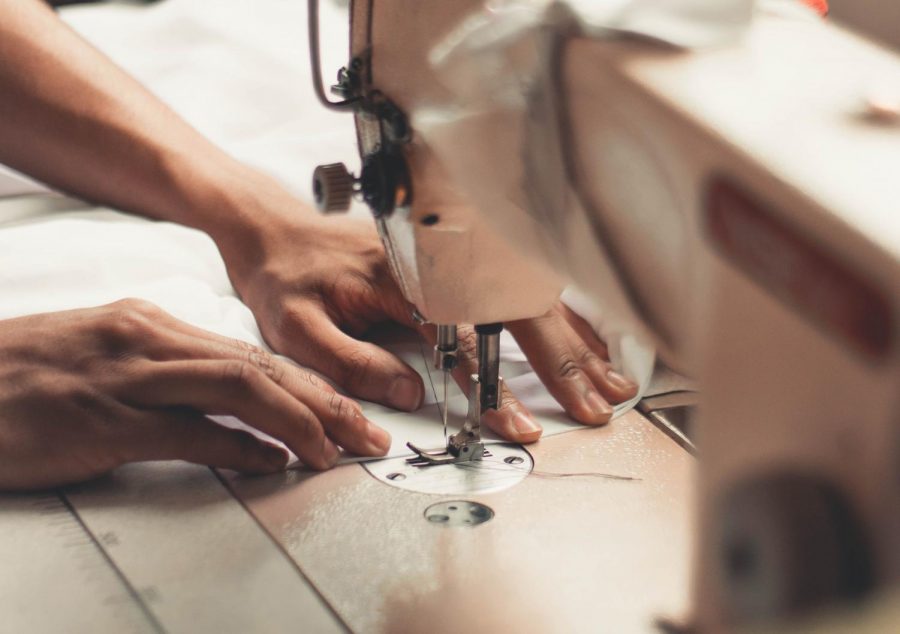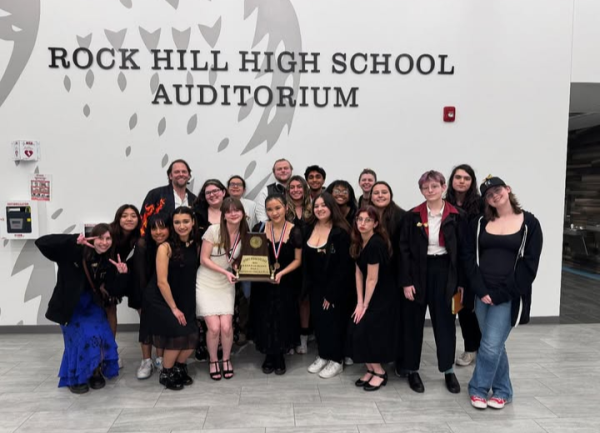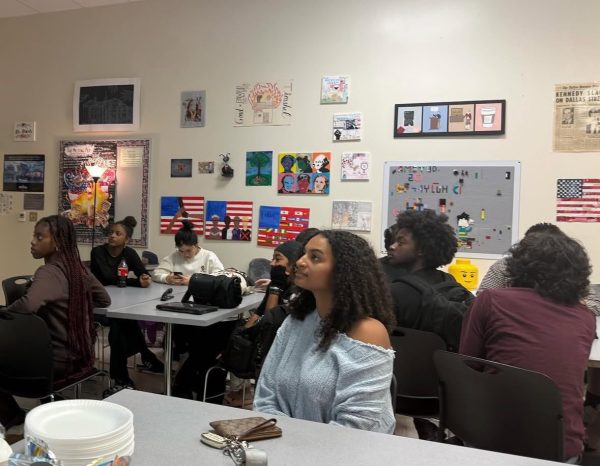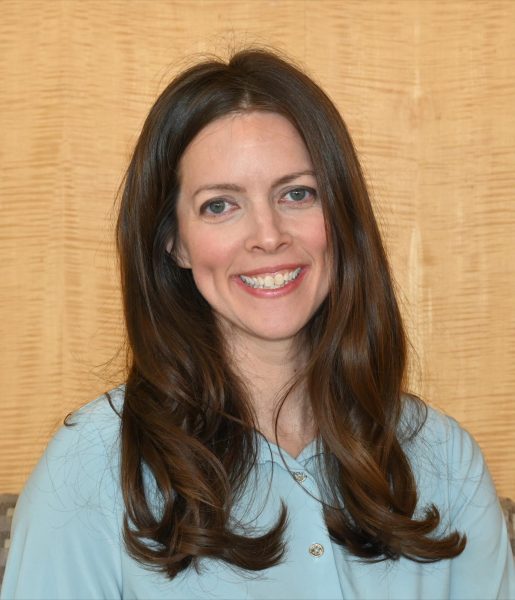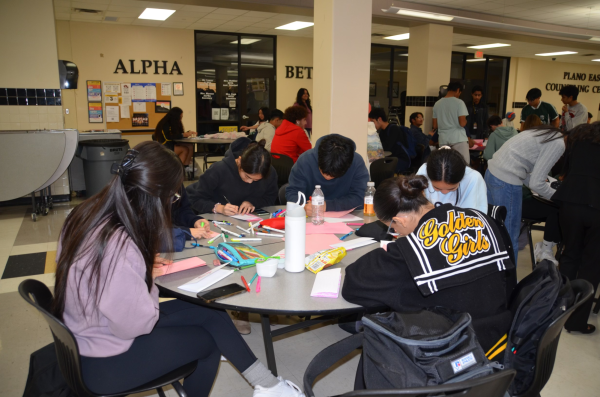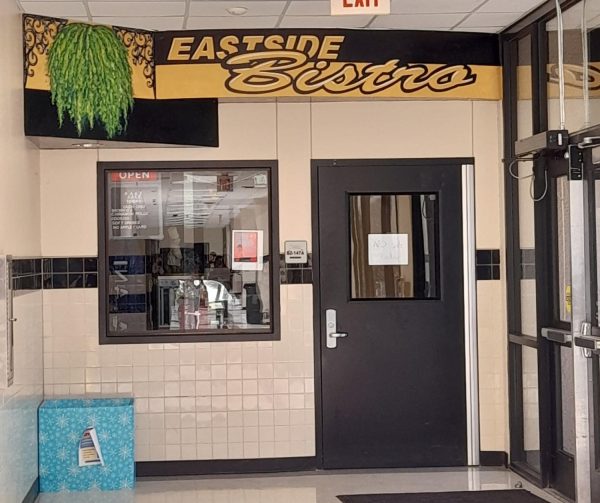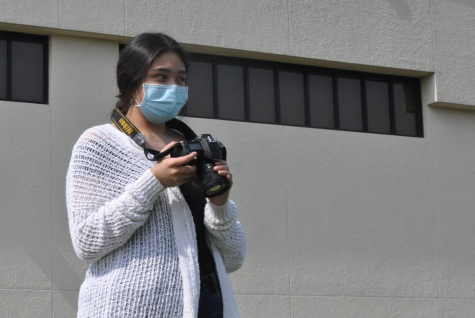Student projects serve front-line workers, elderly
In the midst of the COVID-19 pandemic, students are repurposing their resources and skills to protect, appreciate and comfort front-line workers as well as those most affected by the pandemic.
Healing headbands
After seeing her mother, a Dallas area hospital nurse, come home with pain around her ears from wearing a mask all day, junior Alana Platt decided she wanted to do something to relieve her pain. While surfing Reddit, she came across a post from another nurse showing a headband with buttons sewed onto it that hospital workers could hook their masks on.
“We only had two buttons left [at home] and it’s kind of funny because the buttons actually didn’t match,” Platt said. “Then I found some white headband that had dirt on it. And I was like, ‘You know what? This is gonna work. I’m going to make it work.’”
Platt’s mother returned home the next day with headband requests from three nurses on her floor. While Platt was happy to help and went out to buy more supplies from Walmart, she says this may not be possible for most students.
“[For] a lot of my friends, their parents are really overprotective and won’t let them go out to stores,” Platt said. “Unless they have a supply of headbands and buttons at home, they wouldn’t be able to go out and get them.”
However, Platt still encourages students to do what they can such as writing letters to those on lockdown in nursing homes, calling representatives about legislation for zoos and affected businesses or donating money to other relief efforts.
“People think, “Oh yeah, I can’t help because I’m stuck at home, I can’t do anything,’” Platt said. “But there’s always something you can do, even if you’re stuck at home. As long as you have an internet connection, you can help.”
If you would like to get involved in this project, contact Alana Platt at [email protected].

Entertaining the elderly
In early March, senior Rekha Swamy received a notification that she could no longer visit the nursing home she had taught arts and crafts at since 2019. To help keep their residents entertained in the absence of these activities, Swamy organized a drive through social media collecting puzzles, coloring books, magazines and books.
“A lot of the residents in the nursing home are quite lonely even when the doors are open to visitors,” Swamy said. “Now, they can’t see their families. They’re stuck in these small rooms about the size of my own room. And that’s about it.”
Working out the logistics of a collection drive was challenging at first when Swamy found it hard to overcome her own fear of leaving the house or physically exchanging items for the drive. To circumvent any personal interaction, Swamy tells donors to drop items in a box outside her house and disinfects all items before bringing them to the nursing home.
“I think the biggest step to kind of conquer that fear is to say, ‘Okay, I know there’s danger, I know there’s a possibility of getting the virus no matter what I do, where I go,’” Swamy said. “But there are people less fortunate who are unable to even live their own life. I think the least we can do is at least make someone feel less isolated.”
Overall, Swamy says COVID-19 is uncovering a number of societal issues and calls on those faring well to come to the aid of lower-income groups or those most profoundly affected.
“We’re realizing right now that all of us — we’re all in danger,” Swamy said. “We all should work together no matter what kind of people we are because a virus doesn’t discriminate against social status, background, race, ethnicity or anything like that.”
If you would like to donate, contact Rekha Swamy at (214) 725-7722
Representation and appreciation
Junior Tiffany Hwang combined her love for videography with her passion for advocacy by creating videos presenting the youth’s view on the pandemic as well as showing gratitude to front-line workers. The first video compiles footage from a number of students as they go through their daily routines and describe how the pandemic affects them and those around them.
“I feel like the media or government authorities typically don’t listen to our voices or they don’t really take what we’re saying seriously,” Hwang said. “Through this video, if they have something that can document people’s responses, it will show them what a lot of the younger generations are thinking about the current pandemic.”
Since she doesn’t have any social media accounts, Hwang wanted to create an outlet to show her appreciation for essential workers. Her second video features heartfelt messages of gratitude as well as musical performances meant to boost the spirits of essential workers, once again collected from student submissions.
Hwang originally planned for the project to have three parts, with the extra video serving as commentary on the government’s response to the pandemic. However, she felt presenting her viewpoint on that issue would not be effective because people wouldn’t be willing to hear what she or other students had to say and would stay rooted in their own opinions.
“I feel like before the pandemic hit the United States, everyone was just focused on the elections and just gathering supporters and was very polarized,” Hwang said. “Now, with everyone uniting and just trying to survive and grow stronger through this pandemic, I would hope that we kind of stray away from being polarized and just work together to solve issues, not just for the gain of our own political beliefs.”
Homemade masks
When senior Megan Foster saw hospitals calling upon civilians to provide homemade masks in case of personal protective equipment shortages, she decided to start sewing them herself using an online template.
“My mom is in the medical industry and I didn’t want her to have to go without masks,” Foster said. “Hospitals are going through personal protective equipment very quickly.”
Although cloth masks are effective in preventing the spread of COVID-19, they aren’t necessarily usable in all hospital procedures. However, Foster says making the masks has given her a new outlook on how to help those around her.
“I think that people will probably cut down a little bit on their lives and realize that they can do small things to help every day instead of doing a big thing every once in a while,” Foster said.
Foster encourages students to assess their skills and the needs of their communities to determine how they can help serve those most affected such as elderly or immunocompromised individuals, as well as those dependent on food banks or government aid.
“I guess the biggest thing kind of seems like the smallest thing,” Foster said. “It really is to just stay inside and don’t think you’re above social distancing rules.”
If you or someone you know is working on a relief project, contact Saifiyah Zaki at [email protected]



